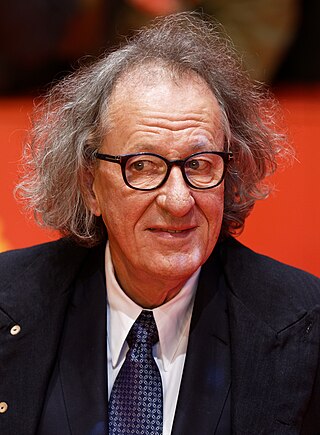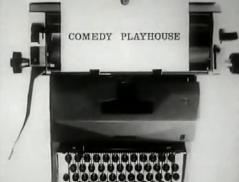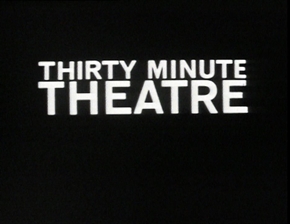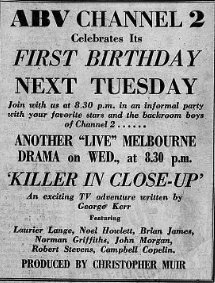Television
- Comedy Theater , an American anthology television series broadcast in 1981
- Comedy Theatre (TV series), an American anthology television series broadcast in 1976 and 1979
Comedy Theatre may refer to:
The year 1959 in television involved some significant events. Below is a list of television-related events during 1959.
The year 1954 in television involved some significant events. Below is a list of television-related events in 1954.

Geoffrey Roy Rush is an Australian actor. Known for often playing eccentric roles on both stage and screen, he has received numerous accolades, including an Academy Award, a Primetime Emmy Award and a Tony Award, making him the only Australian to achieve the Triple Crown of Acting, in addition to three BAFTA Awards and two Golden Globe Awards. Rush is the founding president of the Australian Academy of Cinema and Television Arts and was named the 2012 Australian of the Year.
The following is the 1978–79 network television schedule for the three major English language commercial broadcast networks in the United States. The schedule covers primetime hours from September 1978 through August 1979. The schedule is followed by a list per network of returning series, new series, and series cancelled after the 1977–78 season. All times are Eastern and Pacific, with certain exceptions, such as Monday Night Football.

Comedy Playhouse is a long-running British anthology series of one-off unrelated sitcoms that aired for 128 episodes from 1961 to 1975. Many episodes later graduated to their own series, including Steptoe and Son, Meet the Wife, Till Death Us Do Part, All Gas and Gaiters, Up Pompeii!, Not in Front of the Children, Me Mammy, That's Your Funeral, The Liver Birds, Are You Being Served? and particularly Last of the Summer Wine, which is the world's longest running sitcom, having run from January 1973 to August 2010. In all, 27 sitcoms started from a pilot in the Comedy Playhouse strand.
Playhouse is a common term for a theatre.

Lux Radio Theatre, sometimes spelled Lux Radio Theater, a classic radio anthology series, was broadcast on the NBC Blue Network (1934–35) ; CBS Radio network (1935–54), and NBC Radio (1954–55). Initially, the series adapted Broadway plays during its first two seasons before it began adapting films. These hour-long radio programs were performed live before studio audiences. The series became the most popular dramatic anthology series on radio, broadcast for more than 20 years and continued on television as the Lux Video Theatre through most of the 1950s. The primary sponsor of the show was Unilever through its Lux Soap brand.

Steven James Pemberton is a British actor, comedian, director and writer. He was a writer and actor for BBC's The League of Gentlemen with Reece Shearsmith, Mark Gatiss, and Jeremy Dyson. Pemberton and Shearsmith also co-wrote and starred in the black comedy Psychoville and the anthology series Inside No. 9. His other notable television credits include Doctor Who, Benidorm, Blackpool, Shameless, Whitechapel, Happy Valley and Mapp and Lucia.

C31 Melbourne is a free-to-air community television channel in Melbourne, Victoria, Australia. Its name is derived from UHF 31, the frequency and channel number reserved for analogue broadcasts by metropolitan community television stations in Australia.

An anthology series is a written series, radio, television, film, or video game series that presents a different story and a different set of characters in each different episode, season, segment, or short. These usually have a different cast in each episode, but several series in the past, such as Four Star Playhouse, employed a permanent troupe of character actors who would appear in a different drama each week. Some anthology series, such as Studio One, began on radio and then expanded to television.
The Primetime Emmy Awards, or Primetime Emmys, are part of the extensive range of Emmy Awards for artistic and technical merit for the American television industry. Bestowed by the Academy of Television Arts & Sciences (ATAS), the Primetime Emmys are presented in recognition of excellence in American primetime television programming. The award categories are divided into three classes: the regular Primetime Emmy Awards, the Primetime Creative Arts Emmy Awards to honor technical and other similar behind-the-scenes achievements, and the Primetime Engineering Emmy Awards for recognizing significant contributions to the engineering and technological aspects of television. First given out in 1949, the award was originally referred to as simply the "Emmy Award" until the International Emmy Award and the Daytime Emmy Award were created in the early 1970s to expand the Emmy to other sectors of the television industry.

Ford Theatre, spelled Ford Theater for the original radio version and known, in full, as The Ford Television Theatre for the TV version, is a radio and television anthology series broadcast in the United States in the 1940s and 1950s. At various times the television series appeared on all three major television networks, while the radio version was broadcast on two separate networks and on two separate coasts. Ford Theatre was named for its sponsor, the Ford Motor Company, which had an earlier success with its concert music series, The Ford Sunday Evening Hour (1934–42).

Martin Ellyot Manulis was an American television, film, and theatre producer. Manulis was best known for his work in the 1950s producing the CBS Television programs Suspense, Studio One Summer Theatre, Climax!, The Best of Broadway and Playhouse 90. He was the sole producer of the award-winning drama series, Playhouse 90, during its first two seasons from 1956 to 1958.

The Fountain of Youth is a 1956 television pilot directed by Orson Welles for a proposed Desilu Productions anthology series that was never produced. Based on a short story by John Collier, the short film narrated onscreen by Welles stars Dan Tobin, Joi Lansing and Rick Jason. The Fountain of Youth was televised once, on September 16, 1958, on NBC's Colgate Theatre. It received the prestigious Peabody Award for 1958, the only unsold television pilot ever to be so honored.
General Motors Theatre was a Canadian television anthology drama series of television plays, which ran on CBC Television under various titles from September 18, 1952, until January 1, 1961, and in the US on ABC from October 5 to November 2, 1958. The series mainly consisted of one-hour episodes of romance, adventure, or mystery stories, with some social realist drama plays.
Toby Truslove is an Australian film, theatre and television actor.

Thirty-Minute Theatre was a British anthology drama series of short plays shown on BBC Television between 1965 and 1973, which was used in part at least as a training ground for new writers, on account of its short running length, and which therefore attracted many writers who later became well known. It was produced initially by Harry Moore, later by Graeme MacDonald, George Spenton-Foster, Innes Lloyd and others. Thirty-Minute Theatre began on BBC2 in 1965 with an adaptation of the black comedy Parson's Pleasure. Dennis Potter contributed Emergency – Ward 9 (1966), which he partially recycled in the much later The Singing Detective (1986). In 1967 BBC2 launched the UK's first colour service, with the consequence that Thirty-Minute Theatre became the first drama series in the country to be shown in colour.

Inside No. 9 is a British black comedy anthology television programme that first aired on 5 February 2014. It is written by Steve Pemberton and Reece Shearsmith and produced by the BBC. Each 30-minute episode is a self-contained story with new characters and a new setting, almost all starring Pemberton or Shearsmith. Aside from the writers, each episode has a new cast, allowing Inside No. 9 to attract a number of well-known actors. The stories are linked only by the number 9 in some way, typically taking the form of a door marked with the number 9, and a brass hare statue that is in the background of all episodes. Themes and tone vary from episode to episode, but all have elements of comedy and horror or perverse humour, in addition to a plot twist. Pemberton and Shearsmith took inspiration for Inside No. 9 from an episode of Psychoville, a previous project, which was filmed in a single room – this in turn was inspired by Alfred Hitchcock's Rope.
Miss Mabel is a 1948 stage play by R. C. Sherriff. It has been adapted for television at least five times.

Killer in Close-Up was a blanket title covering four live television drama plays produced by the Australian Broadcasting Commission in 1957 and 1958. It could be seen as the first anthology series produced for Australian television.